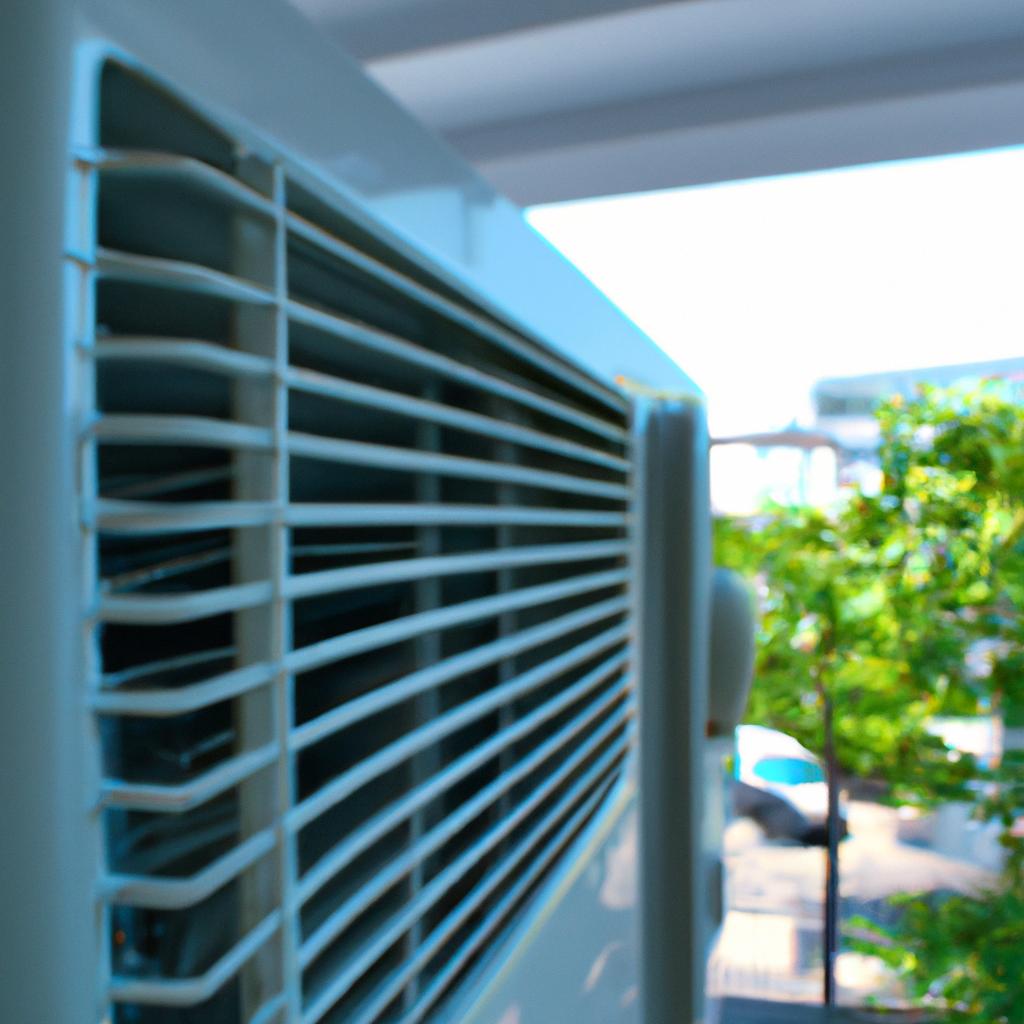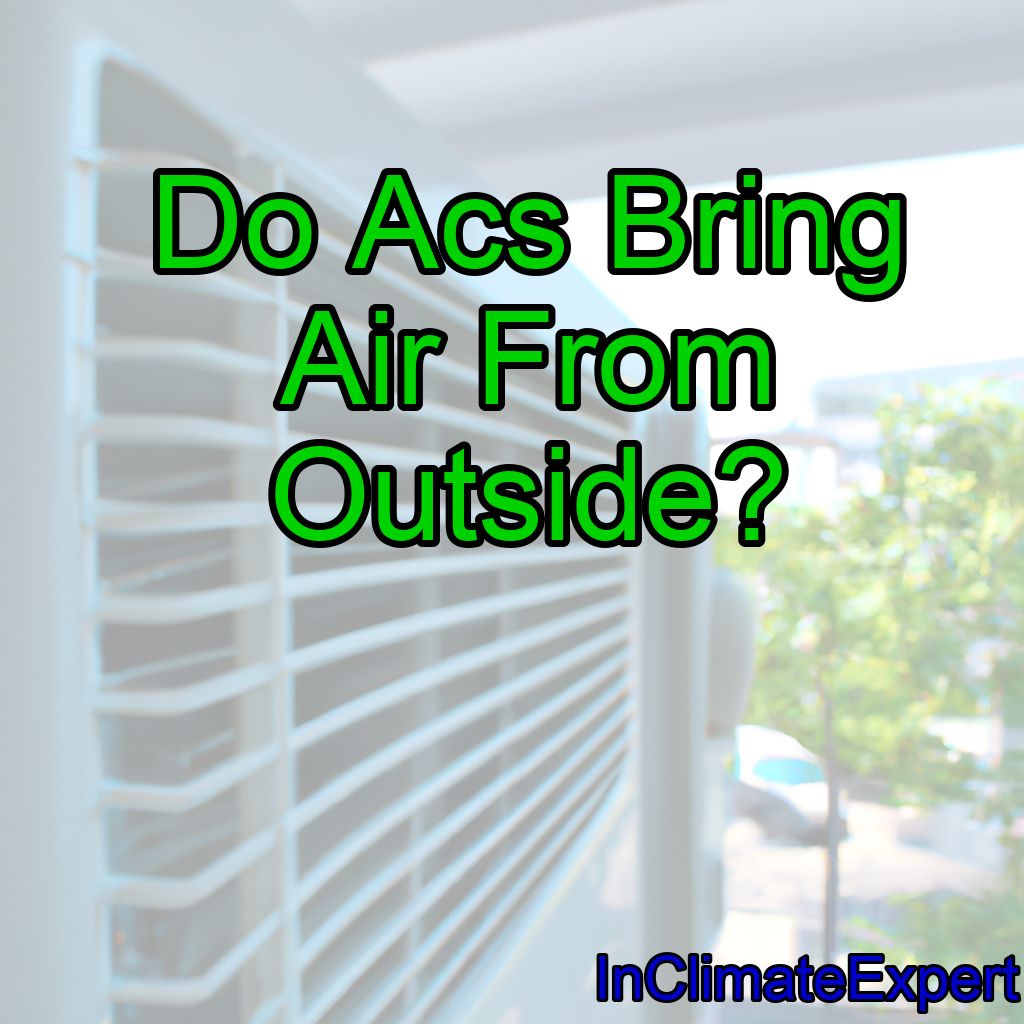Do air conditioners bring in air from outside?
Air conditioning systems (ACs) do not typically bring in air from outside directly. Instead, they work by recirculating and cooling the indoor air. However, some AC systems can be integrated with ventilation systems that allow for fresh outdoor air to be mixed with the indoor air, improving air quality and maintaining a comfortable temperature.
This is a common question that many people have when it comes to their cooling system.
The answer may surprise you, as it depends on the type of AC unit you have and how it is set up.
Firstly, window units and portable ACs typically do bring in some amount of outdoor air, as they rely on an open vent or window to expel hot air from the room.
However, central air conditioning systems usually do not bring in outside air directly.
Instead, they recirculate the indoor air through a series of ducts and filters to cool it down before sending it back into the room.
It’s important to understand how your AC unit works so that you can ensure proper ventilation and indoor air quality for your home or office.

Let’s dive deeper into this topic to learn more about how ACs work and their impact on indoor air quality.
Exploring The Mechanics Of Air Conditioners
Air conditioners (ACs) are devices designed to regulate the temperature of indoor air.
They work by drawing in warm indoor air, passing it over a cooling element, and then releasing cooler air back into the room.
ACs also dehumidify the air, removing excess moisture that can contribute to discomfort and even mold growth.
While some ACs only recirculate indoor air, others bring in outside air as well. This is known as a ventilation feature and can help improve indoor air quality by introducing fresh outdoor air.
However, it’s important to note that this feature may not be present in all types of ACs or may come with additional costs.
Impact Of Acs On Indoor Air Quality
The effects of ACs on pollutants in the air can be both positive and negative. ACs can be a source of indoor pollutants if not regularly maintained, so it’s important to keep up with regular maintenance to ensure good indoor air quality.
AC maintenance and air quality are interconnected, so it’s important to keep up with both for the best results.
Effects Of Acs On Pollutants
Do air conditioning systems really bring fresh air from outside?
This is a common question that many people ask themselves when they think about the impact of ACs on indoor air quality.
In fact, some AC units can bring in fresh air from outside, which can help to dilute indoor pollutants and improve overall air quality.
However, it’s important to note that not all AC units are created equal.
Some older or poorly maintained units may actually circulate indoor pollutants instead of removing them.
Additionally, even if an AC system does bring in fresh outdoor air, it may not be enough to fully mitigate the effects of indoor pollutants such as VOCs and mold spores.
Therefore, it’s essential to properly maintain your AC unit and consider additional measures such as air purifiers to ensure that your indoor environment remains healthy and safe for you and your family.
Acs As Source Of Indoor Pollutants
Now, let’s discuss how air conditioning systems can actually be a source of indoor pollutants.
While ACs can help to improve indoor air quality by bringing in fresh outdoor air, they can also contribute to the buildup of pollutants such as dust and mold if not properly maintained.
AC filters can become clogged with these particles over time, leading to decreased efficiency and potentially even releasing them back into the air.
Additionally, some AC units may produce their own pollutants such as ozone or formaldehyde, which can have negative health effects when present in high concentrations.
Therefore, it’s important to regularly clean and replace AC filters and consider investing in units that are designed to minimize pollutant emissions.
Ac Maintenance And Air Quality
So, in order to prevent ACs from becoming a source of indoor pollutants, it’s crucial to prioritize their maintenance.
Regular cleaning and replacement of filters can significantly reduce the buildup of dust and mold, thereby improving the efficiency of the system while also preventing these pollutants from being released back into the air.
It’s also important to invest in units that are designed to minimize pollutant emissions, as some ACs may produce harmful substances such as ozone and formaldehyde.
By taking these steps, we can ensure that our air conditioning systems not only provide us with cool and comfortable air but also contribute positively to our indoor air quality.
Benefits Of Installing An Air Conditioner
The installation of an air conditioner can help you save energy and improve your health. It’s a great way to enjoy a comfortable home environment without breaking the bank.
Energy Savings
If you’re looking to save money on your energy bills, installing an air conditioner might be a wise investment.
Many modern AC units are designed with energy efficiency in mind, meaning they use less electricity than older models.
Additionally, some AC systems are equipped with features like programmable thermostats and variable speed fans that can help you further reduce your energy consumption.
Another way that air conditioners can help you save money is by bringing in fresh air from outside.
By circulating fresh air throughout your home, you won’t need to rely on electric fans or other appliances to keep the air moving.
This can lead to significant cost savings over time.
Overall, if you’re looking for ways to reduce your monthly expenses and improve the comfort of your home, investing in an energy-efficient air conditioning system is definitely worth considering.
Improved Health
Now, let’s talk about how installing an air conditioner can improve your health.
One of the main benefits is that it can help reduce indoor humidity levels, which in turn can prevent mold and mildew growth. These substances are known to cause respiratory problems and allergies, so keeping them at bay is crucial for maintaining good health.
Additionally, air conditioners can filter out pollutants and allergens from the air, such as dust, pet dander, and pollen. This is especially important for people with asthma or other respiratory conditions.
With improved air quality and reduced humidity levels, you’ll be able to breathe easier and feel more comfortable in your home.
Tips For Optimizing Ac Efficiency
As we discussed earlier, installing an air conditioner comes with a range of benefits.
One of them is that it brings in fresh air from outside, improving the indoor air quality.
But how exactly does this process work?
Well, most modern AC units are designed to bring in outside air through a ventilation system. This helps in maintaining optimal humidity levels and keeps the indoor environment healthy and comfortable.
However, it’s important to note that relying solely on your AC to ventilate your home may not be enough.
In the next section, we’ll discuss some tips on how to optimize your AC’s efficiency while also ensuring proper ventilation for your home.
Conclusion
In conclusion, air conditioners are a staple in many homes and businesses.
They work by extracting hot air from indoor spaces and releasing it outside while bringing in cooler air from outside.
This process helps regulate the temperature and humidity levels inside buildings, creating a comfortable environment for occupants.
While ACs do bring in some fresh air from outside, it’s important to note that they also have the potential to impact indoor air quality.
Regular maintenance and cleaning of filters can help prevent the buildup of dust and other pollutants that can circulate through the system.
Despite their potential drawbacks, the benefits of installing an air conditioner cannot be ignored. From increased productivity in workplaces to improved sleep quality at home, ACs have become a crucial part of modern-day living.
In order to optimize AC efficiency, it’s important to choose the right size unit for your space and keep up with regular maintenance. By doing so, you can ensure that your AC is working at its best while also improving indoor air quality for a healthier living environment.




